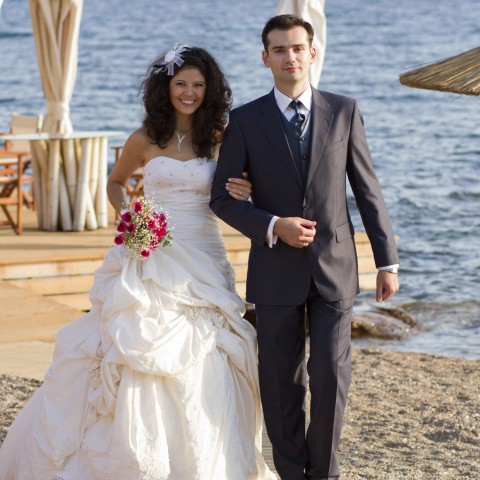
Has an attractive Korean caught your eye, stolen your heart, and won your affections? Are you hoping to enhance your communication and love life with your Korean spouse? Or maybe you’re hoping to expand your dating options by picking up another language?
Learning how to flirt and express your love in Korean is a surefire way to stand out and show your love interest how dedicated you are.
In this article, we’ll teach you romantic Korean phrases you’ll need for every stage of your future relationship:
- Asking someone out
- Advancing your relationship
- Making a marriage proposal
In addition, you’ll learn the most common terms of endearment in Korean and become acquainted with Korean love quotes that are sure to warm your heart.
By the time you’re done reading, you’ll know how to say “I love you,” in Korean several different ways, and for any romantic occasion!
 Table of Contents
Table of Contents
- Confess Your Affection: Pick-Up Lines and More
- After the First Date
- Asking Someone to be Your Girlfriend or Boyfriend
- Fall in Deeper: “I Love You,” and More
- Take it One Step Further: “Will You Marry Me?” and More
- Endearment Terms
- Must-Know Love Quotes
- How KoreanClass101 Can Help You with Korean
1. Confess Your Affection: Pick-Up Lines and More
The first step in winning your crush over is asking them out for a date. This can be intimidating in your native language, let alone in a foreign language like Korean! Below, you’ll find the most commonly used Korean phrases for showing your interest in someone and asking them out.
- → By the way, here are some Common Korean Phrases You’ll Need for a Date and the Top 15 Compliments You Always Want to Hear!
1) 주말에 시간 있어요?
Romanization: Jumaree sigan isseoyo?
Meaning: Are you free this weekend?
Vocabulary
- 주말 (jumal) – “weekend”
- 시간 (sigan) – “time”
- 있어요? (isseoyo?) – “Do you have ___?”
Example
A:
주말에 시간 있어요?
Jumare sigan isseoyo?
“Are you free this weekend?”
B:
네, 토요일에 시간 돼요.
Ne, toyoire sigan dwaeyo.
“Yes, I have time on Saturday.”
A:
그럼 같이 저녁 먹으러 갈래요?
Geureom gachi jeonyeok meogeureo gallaeyo?
“Then would you like to have dinner together?”
2) 카톡해요? [Casual]
Romanization: Katokaeyo?
Meaning: Do you use Kakaotalk?
Vocabulary
- 카톡 (katok) – abbreviation of 카카오톡 (kakaotok) or “Kakaotalk,” a messaging application
- 해요? (haeyo?) – “Do you ___?”
Example
A:
카톡해요?
Katokaeyo?
“Do you use Kakaotalk?”
B:
네.
Ne.
“Yes.”
A:
카톡 아이디 알려줄래요?
Katok aidi allyeojullaeyo?
“Can you tell me your Kakaotalk ID?”
3) 카카오톡 하세요? [Formal]
Romanization: Kakaotok haseyo?
Meaning: Do you use Kakaotalk?
The meaning of this sentence is exactly the same as that of the one above. This sentence is a more formal way to ask for someone’s Kakaotalk ID.
Vocabulary
- 카카오톡 (kakaotok) – “Kakaotalk”
- 하세요? (haseyo?) – “Do you ___?”
Example
A:
카카오톡 하세요?
Kakaotok haseyo?
“Do you use Kakaotalk?”
B:
있지만 자주 안써요.
Itjiman jaju ansseoyo.
“I do, but I don’t use it often.”
A:
아..네.
A..Ne.
“Ah…I see.”
4) 카톡할게.
Romanization: Katokalge.
Meaning: I will talk to you on Kakaotalk.
This is a casual way to tell someone that you’ll send them a message on Kakaotalk. If you want to sound more polite, you can use one of these variations:
- ❖ 메시지 보낼께요. (mesiji bonaelkkeyo) – “I will send you a message.”
❖ 카카오톡으로 연락할게요. (kakaotog-eulo yeonlaghalgeyo) – “I will contact you via Kakaotalk.”
Vocabulary
- 할게 (halge) – “I will ___”
- 메시지 (mesiji) – “message”
- 보낼게요 (bonaelgeyo) – “I will send ___ to you”
Example
A:
저녁 아홉시쯤에 카톡할게!
Jeonyeok ahopsijjeume katokalge!
“I will send you a message at around nine!”
B:
응 알았어!
Eung arasseo!
“Okay!”
5) 같이 저녁 먹으러 갈래요?
Romanization: Gachi jeonyeok meogeureo gallaeyo?
Meaning: Would you like to have dinner together?
This phrase is a polite way to ask someone out. If you want to specify the time, add a word such as 오늘 (oneul), meaning “today,” or 내일 (naeil), meaning “tomorrow.”
Vocabulary
- 같이 (gachi) – “together”
- 저녁 (jeonyeok) – “dinner”
- 먹다 (meokda) – “to eat”
- 가다 (gada) – “to go”
Example
A:
같이 저녁 먹으러 갈래요?
Gachi jeonyeok meogeureo gallaeyo?
“Would you like to have dinner together?”
B:
좋아요. 언제 갈까요?
Joayo. Eonje galkkayo?
“Sure, when shall we go?”
6) 저녁 먹으러 갈래?
Romanization: Jeonyeok meogeureo gallae?
Meaning: Do you wanna have dinner?
This is a more casual way to ask someone out.
Example
A:
내일 저녁 먹으러 갈래?
Naeil jeonyeok meogeureo gallae?
“Do you wanna have dinner tomorrow?”
B:
미안, 내일 약속이 있어.
Mian, naeil yaksogi isseo.
“Sorry, I have some plans for tomorrow.”
7) 영화 보러 갈래?
Romanization: Yeonghwa boreo gallae?
Meaning: Do you want to watch a film?
Vocabulary
- 영화 (yeonghwa) – “movie”
- 보다 (boda) – “to watch”
- 가다 (gada) – “to go”
Example
A:
영화 보러 갈래?
Yeonghwa boreo gallae?
“Do you want to watch a film?”
B:
좋아. 언제 갈까?
Joa. Eonje galkka?
“Sure, when should we go?”

2. After the First Date
Okay, so your first date went amazingly. You think you really like this person and want to meet them again soon. Here are some Korean phrases you can use to let them know you enjoyed yourself and to ask them out for a second date.
- → And don’t forget to check out the Top 10 Romantic Ideas for a Date in Korean. 😉
8) 오늘 저녁 즐거웠어요.
Romanization: Oneul jeonyeok jeulgeowosseoyo.
Meaning: I enjoyed tonight.
Vocabulary
- 오늘 (oneul) – “today”
- 저녁 (jeonyeok) – “evening”
- 즐겁다 (jeulgeopda) – “to enjoy”
Example
A:
오늘 저녁 즐거웠어요.
Oneul jeonyeok jeulgeowosseoyo.
“I enjoyed tonight.”
B:
저도요.
Jeodoyo.
“Me too.”
9) 전화 할게요.
Romanization: Jeonhwa halgeyo.
Meaning: I will call you.
This is a polite way to let someone know that you’ll give him or her a call.
Vocabulary
- 전화 (jeonhwa) – “call”
- 하다 (hada) – “to do”
Example
A:
아홉시에 시간 괜찮아요? 전화 할게요.
Ahopsie sigan gwaenchannayo? Jeonhwa halgeyo.
“Are you free at nine? I will call you.”
B:
좋아요
Joayo.
“Sure.”
10) 집까지 태워다 줄게요.
Romanization: Jipkkaji taewoda julgeyo.
Meaning: I will take you to your house.
If you have a car and want to drive your date back to their home, you can say this phrase.
Vocabulary
- 집 (jip) – “house”
- 까지 (kkaji) – “to ___”
- 태우다 (taeuda) – “to take”
- 주다 (juda) – “to give”
Example
A:
집까지 태워다 줄게요.
Jibkkaji taewoda julgeyo.
“I will take you to your house.”
B:
고마워요.
Gomaweoyo.
“Thank you.”
11) 집까지 데려다 줄게요.
Romanization: Jipkkaji deryeoda julkeyo.
Meaning: I will walk with you to your house.
You could use this phrase if you wanted to talk with your date and walk them safely back to his or her house.
Example
A:
집까지 데려다 줄게요.
Jipkkaji deryeoda julgeyo.
“I will walk with you to your house.”
B:
고마워요.
Gomawoyo.
“Thank you.”
12) 이번 주말에 시간 어때요? [Polite]
Romanization: Ibeon jumare sigan eottaeyo?
Meaning: Do you have time this weekend?
Vocabulary
- 이번 (ibeon) – “this”
- 주말 (jumal) – “weekend”
- 시간 (sigan) – “time”
Example
A:
이번 주말에 시간 어때요?
Ibeon jumare sigan eottaeyo?
“Do you have time this weekend?”
B:
미안해요, 주말에 약속이 있어요.
Mianhaeyo, jumare yaksogi isseoyo.
“Sorry, I have some plans this weekend.”
13) 이번 주말에 시간 어때? [Casual]
Romanization: Ibeon jumare sigan eottae?
Meaning: Are you free this weekend?
Example
A:
이번 주말에 시간 어때?
Ibeon jumare sigan eottae?
“Are you free this weekend?”
B:
미안. 주말에 약속이 있어.
Mian, jumare yaksogi isseo.
“Sorry, I have some plans this weekend.”
14) 언제 시간 되세요? [Polite]
Romanization: Eonje sigan doeseyo?
Meaning: When are you free?
Vocabulary
- 언제 (eonje) – “when”
- 시간 (sigan) – “time”
Example
A:
언제 시간 되세요?
Eonje sigan doeseyo?
“When are you free?”
B:
내일 저녁은 어때요?
Naeil jeonyeogeun eottaeyo?
“How about tomorrow evening?”
15) 언제 시간 돼? [Casual]
Romanization: Eonje sigan dwae?
Meaning: When are you free?
Example
A:
언제 시간 돼?
Eonje sigan dwae?
“When are you free?”
B:
내일 저녁?
Naeil jeoneok?
“Tomorrow night?”
16) 내일 몇 시에 만날까요? [Polite]
Romanization: Naeil myeot sie mannalkkayo?
Meaning: What time do you want to meet?
Vocabulary
- 내일 (naeil) – “tomorrow”
- 몇 시 (myeot si) – “what time”
- 만나다 (mannada) – “to meet”
Example
A:
내일 몇 시에 만날까요?
Naeil myeot sie mannalkkayo?
“What time do you want to meet?”
B:
아홉 시 어때요?
Ahop si eottaeyo?
“How about nine o’clock?”
17) 내일 몇 시에 만날래? [Casual]
Romanization: Naeil myeot sie mannallae?
Meaning: What time do you want to meet?
Example
A:
내일 몇 시에 만날래?
Naeil myeot sie mannallae?
“What time do you want to meet?”
B:
아홉 시 어때?
Ahop si eottae?
“How about nine o’clock?”
18) 우리 지금 만날래요?
Romanization: Uri jigeum mannallaeyo?
Meaning: Do you want to meet now?
Vocabulary
- 우리 (uri) – “us”
- 지금 (jigeum) – “now”
- 만나다 (mannada) – “to meet”
Example
A:
우리 지금 만날래요?
Uri jigeum mannallaeyo?
“Do you want to meet now?”
B:
아홉 시 어때요?
Ahop si eottaeyo?
“How about nine o’clock?”

3. Asking Someone to be Your Girlfriend or Boyfriend
Are you ready to take your relationship up a notch? Here are a couple of cute love phrases in Korean you can use to let the other person know you’d like to make things more serious.
19) 저랑 사귈래요? [Polite]
Romanization: Jeorang sagwillaeyo?
Meaning: Would you want to be my girlfriend / boyfriend?
Vocabulary
- 나랑 (narang) – “with me”
- 사귀다 (sagwida) – “make friends with”
Example
A:
저랑 사귈래요?
Jeorang sagwillaeyo?
“Would you want to be my girlfriend / boyfriend?”
B:
좋아요.
Joayo.
“I would love to.”
20) 나랑 사귈래? [Casual]
Romanization: Narang sagwillae?
Meaning: Do you want to be my girlfriend / boyfriend?
Example
A:
나랑 사귈래?
Narang sagwillae?
“Do you want to be my girlfriend / boyfriend?”
B:
응, 좋아.
Eung, joa.
“Yes, sure.”
4. Fall in Deeper: “I Love You,” and More
Once your relationship is more established, it’s time to really start expressing your feelings for the other person. Below are several affectionate Korean love phrases you can use to do so.
- → Need more Korean love phrases? See our list of the Top 15 Love Phrases for Valentine’s Day!
21) 보고 싶어
Romanization: Bogo sipeo.
Meaning: I miss you.
Vocabulary
- 보다 (boda) – “to see”
- 싶다 (sipda) – “to want (to have something)”
Example
A:
보고 싶어.
Bogo sipeo.
“I miss you.”
B:
나도 많이 보고 싶어.
Nado mani bogo sipeo.
“I also miss you too.”
22) 많이 좋아해
Romanization: Mani joahae.
Meaning: I like you a lot.
Vocabulary
- 많이 (mani) – “a lot”
- 좋아하다 (joahada) – “to like”
Example
A:
많이 좋아해.
Mani joahae.
“I like you a lot.”
B:
나도 많이 좋아해.
Nado mani joahae.
“I also like you a lot.”
23) 만나고 싶어
Romanization: Mannago sipeo.
Meaning: I want to meet you.
Vocabulary
- 만나다 (mannada) – “to meet”
- 싶다 (sipda) – “to want”
Example
A:
만나고 싶어.
Mannago sipeo.
“I want to meet you.”
B:
나도 만나고 싶어.
Nado mannago sipeo.
“I want to meet you too.”
24) 사랑해
Romanization: Saranghae.
Meaning: I love you.
Vocabulary
- 사랑 (sarang) – “love”
- 하다 (hada) – “to do”
Example
A:
사랑해.
Saranghae.
“I love you.”
B:
나도 사랑해.
Nado saranghae.
“I love you, too.”
25) 많이 사랑해
Romanization: Mani saranghae.
Meaning: I love you a lot.
Vocabulary
- 많이 (mani) – “a lot”
- 사랑하다 (saranghada) – “to love someone”
Example
A:
많이 사랑해.
Mani saranghae.
“I love you a lot.”
B:
나도 많이 사랑해.
Nado mani saranghae.
“I love you a lot, too.”
26) 나도 사랑해.
Romanization: Nado saranghae.
Meaning: I love you, too.
Vocabulary
- 나도 (nado) – “me too”
- 사랑하다 (saranghada) – “to love someone”
Example
A:
많이 사랑해.
Mani saranghae.
“I love you a lot.”
B:
나도 사랑해.
Nado saranghae.
“I love you, too.”
27) 안아주고 싶어.
Romanization: Anajugo sipeo.
Meaning: I want to hug you.
Vocabulary
- 안다 (anda) – “to hug”
Example
A:
안아주고 싶어.
Anajuga sipeo.
“I want to hug you.”
B:
빨리 안아줘.
Ppalli anajwo.
“Quick, hug me.”

5. Take it One Step Further: “Will You Marry Me?” and More
Ready to commit? Then you’ll want to memorize these Korean love phrases for proposing marriage by heart!
- → Need more options to make your moment extra-special? See our list of Marriage Proposal Lines in Korean.
28) 나랑 결혼해 줘.
Romanization: Narang gyeolhonhae jwo.
Meaning: Marry me.
Vocabulary
- 나랑 (narang) – “with me”
- 결혼 (gyeolhon) – “marriage”
Example
A:
나랑 결혼해 줘.
Narang gyeolhonhae jwo.
“Marry me.”
B:
응!
Eung!
“Yes!”
29) 나랑 결혼해 줄래?
Romanization: Narang gyeolhonhae jullae?
Meaning: Will you marry me?
Example
A:
나랑 결혼해 줄래?
Narang gyeolhonhae jullae?
“Will you marry me?”
B:
응, 좋아!
Eung, joa!
“Yes, sure!”
30) 당신이 없는 삶은 상상할 수 없어요.
Romanization: Dangsini eopneun sameun sangsanghal su eopseoyo.
Meaning: I cannot imagine my life without you.
Vocabulary
- 당신 (dangsin) – “you”
- 없다 (eopda) – “none”
- 삶 (salm) – “life”
- 상상하다 (sangsanghada) – “to imagine”
Example
A:
당신이 없는 삶은 상상할 수 없어요.
Dangsini eopneun salmeun sangsanghal su eopseoyo.
“I cannot imagine my life without you.”
B:
저도요.
Jeodoyo.
“Me too.”
31) 영원히 당신과 함께하고 싶어요.
Romanization: Yeongwonhi dangsingwa hamkkehago sipeoyo.
Meaning: I want to be with you forever.
Vocabulary
- 영원히 (yeongwonhi) – “forever”
- 당신과 (dangsingwa) – “with you”
- 함께 (hamkke) – “together”
- 하다 (hada) – “to do”
Example
A:
영원히 당신과 함께하고 싶어요.
Yeongwonhi dangsingwa hamkkehago sipeoyo.
“I want to be with you forever.”
B:
저도요.
Jeodoyo.
“Me too.”
32) 너랑 평생 같이 있고 싶어.
Romanization: Neorang pyeongsaeng gachi itgo sipeo.
Meaning: I want to be with you all my life.
Vocabulary
- 너랑 (neorang) – “with you”
- 평생 (pyeongsaeng) – “forever”
- 같이 (gati) – “together”
- 있다 (itda) – “to be”
Example
A:
너랑 평생 같이 있고 싶어.
Neorang pyeongsaeng gachi itgo sipeo.
“I want to be with you all my life.”
B:
나도.
Nado.
“Me too.”

6. Endearment Terms
Here’s a list of cute Korean endearment terms you can call your loved one!
자기야 (jagiya) – “darling”
This word is a common nickname given to one’s boyfriend/girlfriend or husband/wife.
여보 (yeobo) – “honey”
This one is more commonly used between husbands and wives.
~엄마 (umma) / ~아빠 (appa) – “~mom” / “~dad”
In Korea, if you’re married and have children, it’s very common to be called: [ your child’s name + “mother” or “father” ]. For example, if you’re a wife and you have a child named Soyeon, people (especially your husband) would call you “Soyeon’s mother.”
남자친구 (namjachingu) – “boyfriend”
There’s also a shortened version of this word used by the younger generations (especially online): 남친 (namchin) – “boyfriend.”
여자친구 (yeojachingu) – “girlfriend”
A shortened version is: 여친 (yeochin) – “girlfriend.”
애인 (aein) – “lover”
약혼자 (yakhonja) – “fiance”
7. Must-Know Love Quotes
내가 사랑이 뭔지 안다면 당신 덕분입니다.
Naega sarangi mwonji andamyeon dangsin deokbunimda.
“If I know what love is, it is because of you.”
당신 덕분에 난 더 좋은 사람이 되고 싶어졌어요.
Dangsin deokbune nan deo joeun sarami doego sipeojyeosseoyo.
“You make me want to be a better man.”
우리는 천생연분이야.
Urineun cheonsaengyeonbuniya.
“We were meant to be together.”

8. How KoreanClass101 Can Help You with Korean
In summary, you’ve learned various Korean love phrases to express your love to someone. Which of these phrases did you like the most, and why? What are some common love phrases in your language? We look forward to hearing from you!
To learn more about Korean love phrases, check out these pages on KoreanClass101.com.
- Korean Quotes About Love
- 15 Love Phrases for Valentine’s Day
- Blind Date
- My Beautiful Girlfriend
- So…Do You Have a Girlfriend in Korea?
We hope you enjoyed studying the Korean language today, and we wish you luck with your Korean studies!
Remember that KoreanClass101.com will be here with you on every step of your journey with some of the best learning resources on the internet!
Now, get out there and start winning some hearts. 😉










